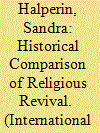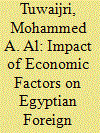| Srl | Item |
| 1 |
ID:
120864


|
|
|
|
|
| Publication |
2013.
|
| Summary/Abstract |
The article examines the history of the relationship between the Iranian and the Russian monarchies during the nineteenth and early twentieth century. Drawing on a broad range of hitherto unexplored sources in Russian, the article analyzes Russian attitudes towards the Qajars, for whom the Romanov tsars were at the same time the most important ally and the biggest threat. The article focuses on the symbols and ceremonies by which the monarchs represented their relations, and by which they expressed symbolic competition, recognition and domination. The article thus opens a new perspective on Russia's influence on the Qajars and also raises questions about the comparative history of both monarchies.
|
|
|
|
|
|
|
|
|
|
|
|
|
|
|
|
| 2 |
ID:
144221


|
|
|
|
|
| Summary/Abstract |
Contrary to the long-standing idea of a scientific failure in early modern China as compared to Europe, some recent work has emphasized the existence of a tradition of ‘evidential’ research in the natural sciences, antiquarianism, and geography, especially during the Sung, Ming, and Qing periods. This article seeks to develop this new perspective by offering a comparative history of the genres of travel writing and ethnography in early modern Europe and Ming/early Qing China. We argue that there were qualitative as well as quantitative differences in the way that these genres functioned in each cultural area. Even when we find apparent similarities, we note different chronological rhythms and a different position of these genres of travel writing within a wider cultural field—what we might term their ‘cultural relevance’. The specific nature of Chinese state imperialism—or, conversely, the particular nature of European overseas colonialism—played a role in determining the type of ethnographic approach that came to predominate in each cultural area. These parallels and differences suggest a fresh perspective on the cultural origins of the ‘great divergence’.
|
|
|
|
|
|
|
|
|
|
|
|
|
|
|
|
| 3 |
ID:
160051


|
|
|
|
|
| Summary/Abstract |
Predictions about the future of the Middle East have proliferated in step with recent events and escalating tensions in the region. This paper highlights the usefulness of historical comparative research for addressing predictive questions and, specifically, those relating to the current Islamic revival. It challenges assumptions that have prevented researchers from exploring this avenue of research; and describes a generally overlooked chapter in modern European history: Europe's nineteenth century revival of militant, literal, religion, and the region-wide, battle it unleashed between religious and secular forces through the region. It then highlights similarities, both in the nature of revivals in Europe and the Middle East and of the socio-economic structures which sustained them. Finally, it suggests how and why the battle between religious and secular forces in Europe came to an end. While, it does not offer predictions for the Middle East, it suggests how comparative insights might contribute to producing better ones.
|
|
|
|
|
|
|
|
|
|
|
|
|
|
|
|
| 4 |
ID:
174381


|
|
|
|
|
| Summary/Abstract |
This article attempts to further theoretical and empirical understanding of the extent to which the economic factor had been critical in determining the Egyptian foreign policy between 1978 and 2010. While the following 32 years recorded major shifts in Egypt’s domestic, regional and international affairs, the larger parameters of its foreign policy were forged in the 1970s when specific economic pressures largely determined in which direction Cairo would move. Thus, this analysis seeks to substantiate the argument that the primacy of the domestic sphere has remained recurrent. It also is contended that while economy may have been the catalyst of major foreign policy shifts in Egypt, it was indeed regime security that was—and remains—the primary determinant of the Egyptian foreign policy. The article, hence, concludes that Egypt’s foreign policy was thus determined by economic factors only to the extent that it did not endanger the security of the regime.
|
|
|
|
|
|
|
|
|
|
|
|
|
|
|
|
| 5 |
ID:
127188


|
|
|
|
|
| Publication |
2013.
|
| Summary/Abstract |
Professor Joseph Soeters shows admirable ambition in comparing national styles of conflict resolution and is extremely eager to draw historical lessons from such comparative exercises. However, he gets entangled in national mythmaking as he underestimates the complexity of comparative history of this kind. Particularly the establishment of true causal links between national (strategic) cultures and actual tactical behaviour on the ground is far more difficult than he suggests in his recent book chapter and his reply to my article in this journal.
|
|
|
|
|
|
|
|
|
|
|
|
|
|
|
|